Can apps move the #MeToo movement forward?
- Published
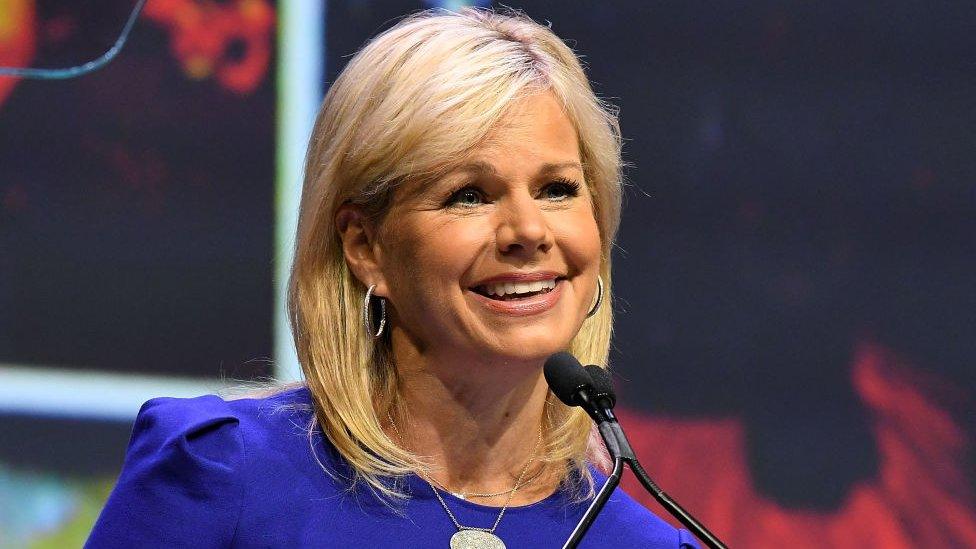
Gretchen Carlson was one of the first women to speak out when the #MeToo movement began
Gretchen Carlson is as composed as you would expect a former news anchor to be, remembering the day just over five years ago when she became the news.
"I had been at Fox [News] 11 years. It was my dream job. I do not think any woman or man ever expects to find a toxic workplace situation. But that is what ended up happening to me".
Mrs Carlson shocked the world when she filed a lawsuit against Fox News chairman, Roger Ailes, on July 16, 2016, alleging she had been fired for refusing his sexual advances.
According to Mrs Carlson's complaint, Mr Ailes had told her: "I think you and I should have had a sexual relationship a long time ago. You'd be good and better, and I'd be good and better".
Mr Ailes denied this exchange ever happened. But when more than a dozen other women came forward with similar complaints, he was forced to leave the network, and Mrs Carlson was awarded what was reported to be $20m (£14.65m) in compensation.
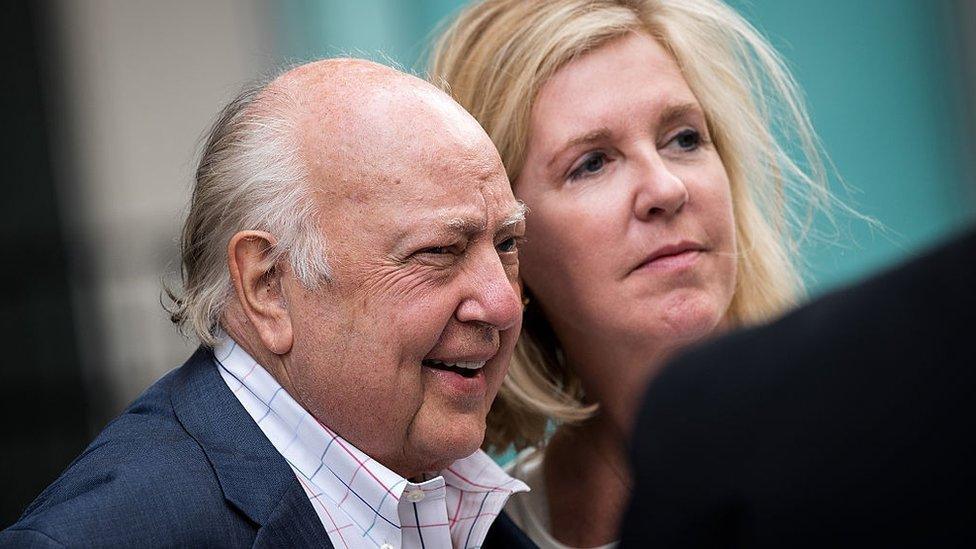
Roger Ailes and his wife Elizabeth Tilson
"We regret and apologise for the fact that Gretchen was not treated with the respect and dignity that she and all of our colleagues deserve," 21st Century Fox, which owns Fox News, said at the time.
The lawsuit also triggered an extraordinary response, Mrs Carlson says. She received thousands of messages of support, many from women from all walks of life alleging similar harassment from their workplace colleagues and bosses.
The story also formed the basis for a Hollywood movie, "Bombshell", starring Charlize Theron and Nicole Kidman in the role of Mrs Carlson. She says she enjoyed the movie, but regretfully not much else.
She was required to sign a non-disclosure agreement (NDA) by Fox as part of the settlement.
"I had no way of knowing back then that we would be in this cultural revolution right now. I was the first to jump off the cliff on July 6, 2016, and now the world has been awakened. There is no turning back."
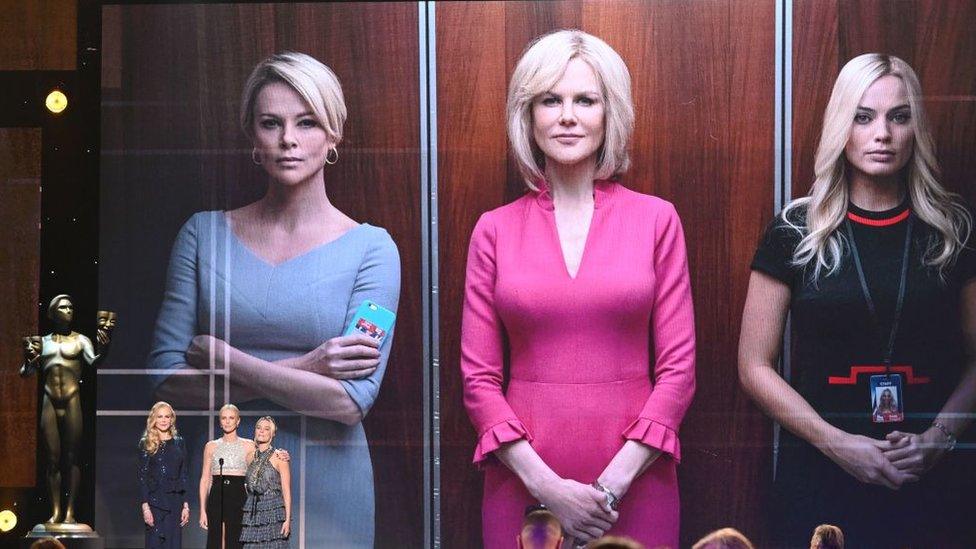
Nicole Kidman, Charlize Theron and Margot Robbie presenting a clip of "Bombshell" during the 2020 Annual Screen Actors Guild Awards show
This and the subsequent downfall of the Hollywood mogul, Harvey Weinstein, and other powerful figures, quickly propelled #MeToo into a worldwide movement.
Mrs Carlson has launched a non-profit organisation, Lift Our Voices, aimed at promoting women's rights in the workplace and eradicating silencing mechanisms like NDAs which she says are now routinely signed by about one third of all US employees.
"They cover every aspect of your job, meaning any toxic workplace issue. Sometimes you cannot even talk about your pay."
The US Equal Employment Opportunity Commission found in 2016 that while anywhere from 25-85% of women had experienced workplace harassment, three-quarters of them were unwilling to report their experiences.
Mrs Carlson believes they have good reason to stay silent. Even if their complaints are believed and they get compensation, the bad blood means they will likely leave, muzzled by an NDA, and will struggle to find work again.
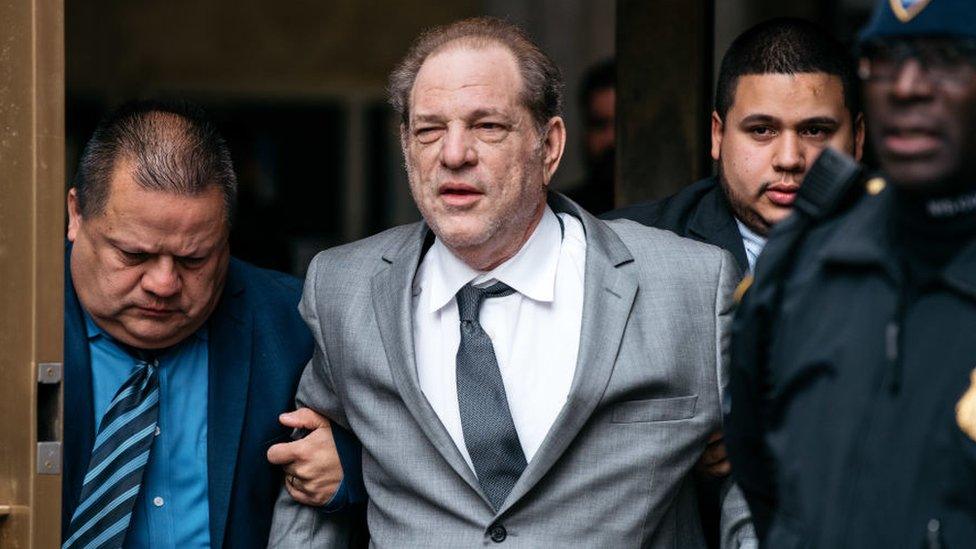
Harvey Weinstein became one of the most high-profile targets of the #MeToo movement
"You try to go out to get a new job, and the new employer says, 'Well, why did you leave that firm?' and you can't tell them. So now they look at you, and they say, 'Well, there must be something wrong with this person. Why they can't tell us anything about why they left their last place of employment?' So these women never get hired ever again".
Nuala Walsh, a co-founder and non-executive director at the Global Association of Applied Behavioural Scientists, quotes recent research indicating that those who do speak out overwhelmingly regret doing so.
"Some 82% were retaliated against, 60% lost their jobs, 17% lost their homes, and as many as 10% attempted suicide. The weight of retaliation is inevitable. But Human Resources departments will ultimately put the company's reputation first".
The problems for those who speak out are worse if the alleged predator is in senior management, she says.
Mrs Carlson and Ms Walsh argue that an independent ombudsman should be available for whistle-blowers to avoid the conflicts of interest that HR departments face.
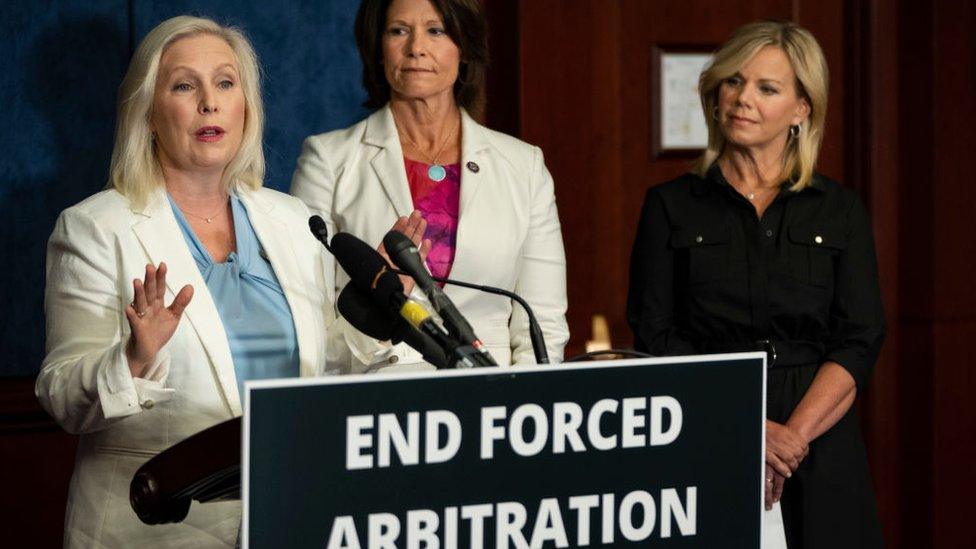
Senator Kirsten Gillibrand, Representative Cheri Busto and Gretchen Carlson announce bipartisan legislation to empower sexual assault and harassment survivors
However, many representatives of the industry disagree.
"It's the role of HR to protect individuals from sexual harassment" insists Rachel Suff, the senior policy advisor for employment relations at the UK's Chartered Institute of Personnel and Development.
"HR is meant to be pro-active and inclusive. If you're just using a third party ombudsman that's not dealing with the underlying situation. Employers have a legal responsibility to protect their workers' welfare".


A way forward
Could technology help to provide an answer here?
Two companies have created mobile phone apps aimed at supporting employees who wish to report workplace misconduct.
Vault is one of these, an app that allows workers to report unwanted advances in real time. A setting also crucially reveals to users whether there are others suffering at the hands of a specific colleague.
"Reporters don't see how many other complaints there are, but they do have the power to say, I will only report this if there are others suffering similar things," says Vault's founder Neta Meidav, whose own experiences of harassment in her 20s inspired her to create the technology.
"I definitely would have reported if I had known I was not the only one. It would have changed everything for me," she says. "It is not just the solidarity it provides. It is also the credibility that comes with it, knowing I will be believed."
If people wish to remain anonymous, victims can still submit documentary or other evidence to company management via the app.
"What we are aiming to do is to see that things are resolved before they become the next lawsuit."
Ms Meidav says that dozens of companies have taken up the technology, which targets all types of corporate misconduct, and the response has been positive, reinforcing workers' trust and pride in their employers.
"I can reassure companies that this has not caused an avalanche of complaints. No one has been overthrown from their chair. Usually it has helped sift through minor problems and complaints and stopped them getting out of hand."
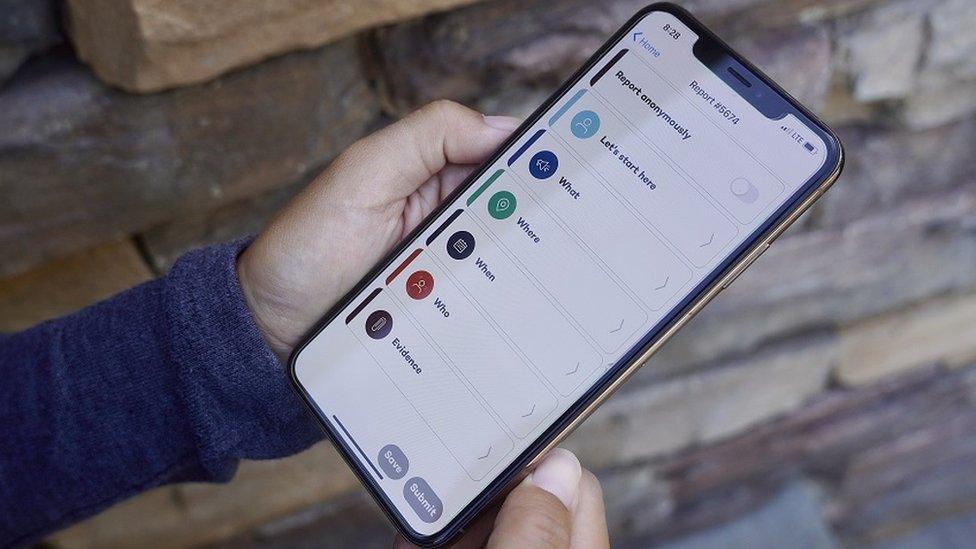
The #NotMe app allows users to report incidents anonymously on their phones
Vault requires buy-in from companies before staff can use it. However, California-based app, NotMe, goes a step further; it is available to anyone.
"When you send an anonymous note, no one can follow through with you," says NotMe's CEO and founder, Ariel Windling.
"Whether it's an email, video or text messages, you can submit all of these things through the platform. We expect people to report in real time and we want companies to be put on notice."
Ms Meidav says soon-to-be-introduced EU rules requiring large companies to support internal reporting and protect those who do from retaliation, as well as larger awards in the US for whistle-blowers, have supported the spread of such platforms.
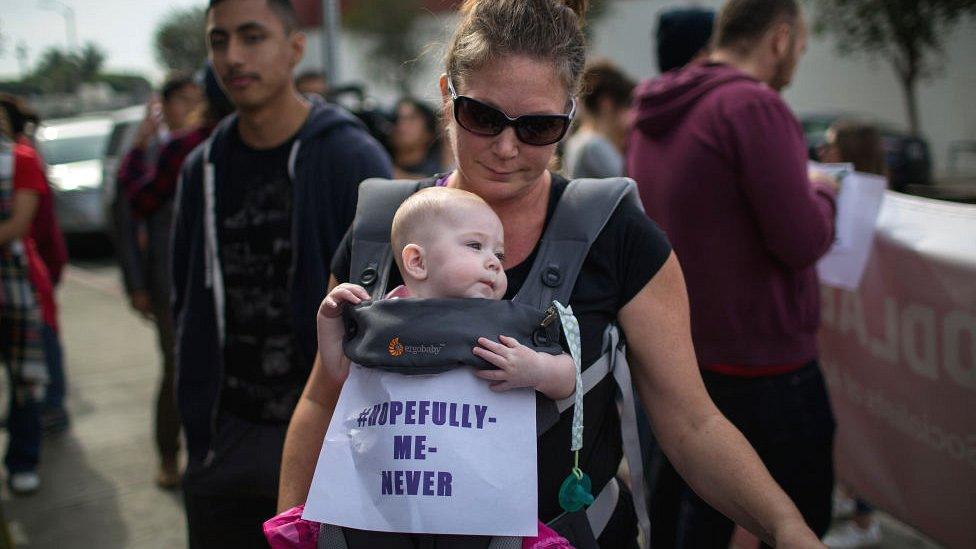
#MeToo advocates are hopeful the change being made now will help protect future generations
Gretchen Carlson is also hopeful that a bill she has championed outlawing forced arbitration in sexual harassment cases will pass through Congress this year: "We're reaching out to corporations one by one, and we're saying join our fight. Get on the right side of history.
But just what will victory look like?
"It will be getting through to our younger generations, and finally getting them to respect women in the way that we believed we had already achieved," says a defiant Mrs Carlson.